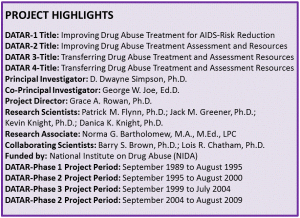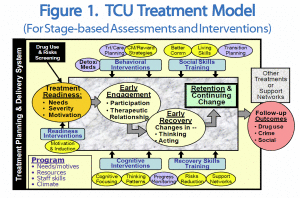
Large studies based on nationwide samples have repeatedly demonstrated the effectiveness of drug abuse treatment in natural settings and the importance of retention to posttreatment outcomes. In response to recurring calls for studying “the black box” and the need to know more about how treatment works, completion of the 20-year Drug Abuse Reporting Program (DARP) project was followed by a 20-year DATAR project (funded in four 5-year phases). Its first phase, entitled Improving Drug Abuse Treatment for AIDS-Risk Reduction (DATAR-1), began in 1989 as a NIDA treatment research demonstration grant and in 1995 was continued for another 5 years, entitled Improving Drug Abuse Treatment Assessment and Resources (DATAR-2). These projects were based on the premise that treatment services research should have practical objectives, be carried out in real-world settings, and include assessments for monitoring client progress over time (with routine feedback to treatment staff). With the general goal of improving therapeutic interventions as well as understanding the treatment dynamics involved, over 1,500 opioid users were treated in four outpatient methadone treatment programs in Texas during 1990 to 1999, under DATAR 1 & 2.
This body of research now defines elements of a basic model for effective drug treatment. It is a framework for integrating findings about how client and program attributes interact to influence the degree to which clients become engaged in treatment and remain long enough to show evidence of recovery while in treatment and at follow-up. The TCU Treatment Model likewise portrays how specialized interventions as well as health and social support services promote stages of recovery (see Figure 1). DATAR-1 & 2 Project phases also have led to the development of a comprehensive set of cognitive and behavioral-based interventions with demonstrated effectiveness as part of a stage-based model of treatment.
Particularly important for increasing early engagement in treatment is a set of cognitive and behavioral-based interventions. The cognitive interventions (especially those related to increasing levels of treatment readiness for low-motivated clients) proved useful for improving therapeutic relationships and retention. Indeed, they became the focus of another TCU project entitled “Cognitive Enhancements for the Treatment of Probationers” (CETOP; PI, Don Dansereau) for correctional populations where treatment readiness and motivation are commonly low. TCU interventions are manual-driven and evidence-based, making them well suited for disseminating these innovations into field practice. The TCU interventions follow principles of TCU Mapping-Enhanced Counseling (also known as node-link mapping) as the therapeutic platform for planning and delivering clinical services.
Treatment Intervention Manuals
Bartholomew, N. G., Chatham, L. R., & Simpson, D. D. (1994, revised). Time out! For me: An assertiveness/sexuality workshop specially designed for women. Fort Worth: Texas Christian University, Institute of Behavioral Research.
This manual provides counselors with a curriculum for leading a 6-session workshop for women. Issues addressed include sexuality, the impact of gender stereotypes, self-esteem, assertiveness skills, and reproductive health issues. Studies have shown that participation in the Time Out! For Me workshop increases knowledge, self-esteem, communication skills, and treatment tenure for women.
Bartholomew, N. G., & Simpson, D. D. (1996). Time out! For men: A communication skills and sexuality workshop for men. Fort Worth: Texas Christian University, Institute of Behavioral Research.
This manual features materials for leading an 8-session workshop for men who want to improve their intimate relationships. Communication skills, self-esteem enhancement, sexual health information, and conflict resolution skills are presented as a foundation for helping resolve relationship problems.
Bartholomew, N. G., Simpson, D. D., & Chatham, L. R. (1993). Straight ahead: Transition skills for recovery. Fort Worth: Texas Christian University, Institute of Behavioral Research.
This manual provides a step-by-step curriculum for leading a 10-part workshop designed to reinforce key recovery concepts. The emphasis is on building and enhancing support networks in the community (12-step fellowships, family, friends) and on improving social skills, problems solving, and self-efficacy in order to foster recovery maintenance.

Reference
Simpson, D. D. (2004). A conceptual framework for drug treatment process and outcome. Journal of Substance Abuse Treatment, 27, 99-121. [Abstract]